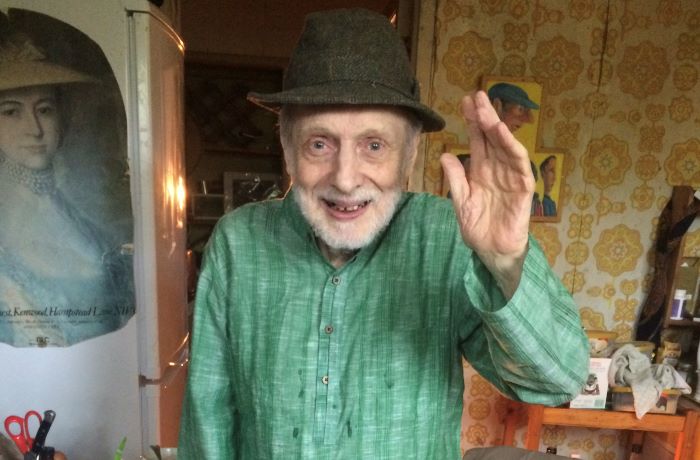![]() Saul Bellow’s famous short story “A Silver Dish” begins with, “What do you do about death?” The death in question is that of an old father, and the narrative zips back and forth in time as his son tries to make sense of his complex relationship to the man. Filmmaker Simon Chambers found himself saddled not with the memories of a dead loved one but with the reality of an aging relative with few to help him. Chambers’s uncle, David, a retired actor in his 80s, kept pestering his nephew with phone calls and requests for his return (Simon was away trying to make a documentary in India) until Simon agreed with his sisters that the best option was for Simon to come back and attend to him—the nieces were far too “bossy” for David’s liking. This documentary, about David’s last years and Simon’s experience caring for him, was essentially an accident born from this discovery: The two of them realized they got on much better if Simon brought his camera to the house.
Saul Bellow’s famous short story “A Silver Dish” begins with, “What do you do about death?” The death in question is that of an old father, and the narrative zips back and forth in time as his son tries to make sense of his complex relationship to the man. Filmmaker Simon Chambers found himself saddled not with the memories of a dead loved one but with the reality of an aging relative with few to help him. Chambers’s uncle, David, a retired actor in his 80s, kept pestering his nephew with phone calls and requests for his return (Simon was away trying to make a documentary in India) until Simon agreed with his sisters that the best option was for Simon to come back and attend to him—the nieces were far too “bossy” for David’s liking. This documentary, about David’s last years and Simon’s experience caring for him, was essentially an accident born from this discovery: The two of them realized they got on much better if Simon brought his camera to the house.
The result of this accidental film is moving, maddening, multifaceted in the questions it poses, and of significant depth. It is, on one hand, as good a portrait as any of the challenges of maintaining patience and sympathy when confronted with an aging person who can no longer be trusted to take care for himself, but who does not want to give up his independence. Simon returns to his uncle’s home to discover an untended hoarder’s labyrinth, replete with towers of books, old cans, and the like, but also jars of David’s urine, and treacherous electric heaters that David uses instead of central heating. These heaters char his legs over time, giving them an unsightly, swollen coat of what looks like eczema, and eventually cause the place to burn down. This house (which, by the way, is also mouse infested) is photographed faithfully by Simon in all its unlovely details, so much so that we can almost smell the stifling and decaying atmosphere.
Simon does the same with David himself, who is recorded not only in multiple states of undress, but also in multiple modes of being. So, mixed in with the songs, skits, and Shakespeare recitations that pepper his speech with gleeful spontaneity are the circular arguments, the interruptions, and the calls in the middle of the night. Often, an unseen Simon tries to remain calm and reason with him—a certain forced quality is always present in his voice. While many sequences illustrate the challenges of maintaining sympathy for the uncle, they also highlight David’s plight and nod toward the immense struggle of securing state-supported care for the elderly in these times of budget cuts and bureaucracy. Though Simon and his siblings eventually manage to get David into a nice (and pricey) home for aging actors, his journey watching social services treat his uncle like a hot potato leads him to worry about his own future.
Most of all, this film succeeds in the human drama it brings to life, of David’s struggle to relinquish responsibility and accept death and Simon’s fight to maintain compassion. In spite of his denial and occasional self-destruction, it is hard not to fall in love with David a little. In his relentless playfulness, there is a ghost of the fun uncle Simon describes encountering as a child, and there is much to wonder regarding his largely undiscussed life.
He and Simon are both gay, and David did not come out of the closet until he was 55. There are occasions when he alludes to the very different world into which he was born, and it reminds you how a wealth of experience disappears whenever someone dies. None of this is to mention his near constant recitation of Shakespeare, King Lear in particular. Though sometimes the words are lost in the haze of dementia, it is clear from his poignant delivery that he understands these texts very well and makes you imagine what sort of an actor he was. Many of the Lear quotes, which he pulls out of his hat, are pertinent to the situation at hand. In its low-key way, this documentary is the story of a certain Lear and the nephew who is his Fool. Simon comments on the resemblance himself.







Leave A Comment